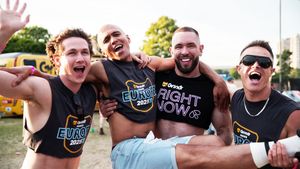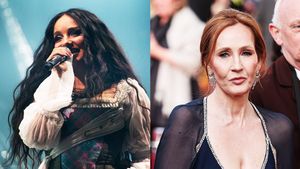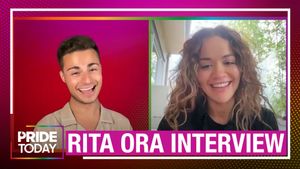When I first saw Lindsay Lohan in The Parent Trap I thought, Man, that's one ugly kid; she's never going to make the transition into an adult star. I thought the same thing about Alyson Hannigan (back before Buffy and How I Met Your Mother made her a star) and Seth Green (long before Austin Powers and his funny upcoming TV series, Dads). I realize now I'm not great at determining who'll make that jump from cute kid to successful adult Hollywood star, and that I've clearly got some weird bias against freckle-faced, redheaded children.
Seth and Alyson are on the top of my love 'em list today, and I have to admit that Lindsay is too. She actually grew on me, and by Mean Girls I was quasi-fascinated.
Years later, when Lindsay began an on-again off-again, in-the-tabloids-way too-often relationship with Samantha Ronson, I was thrilled. Not with the antics and turbulent nature of their relationship, but with the idea that there was a bankable, A-list actress who was conventionally beautiful, young, feminine, a sex symbol, and who was hopefully ready to tell the world she was lesbian or bisexual.
But it didn't quite happen. I spent years trying earnestly to get her to talk to me. I'm a fairly spirited celebrity skirt-chaser, and many women have come out to me on record as something other than straight, from Angelina Jolie to Sinead O'Connor. It's what I love to do, because when celebrities come out it can have a huge impact on American cultural values. Celebrities are our royalty, for better or worse, and having our icons we identify with identify their whole selves makes life easier for every LGBT person.
But I couldn't report on the relationship or her orientation until she was ready to come out (my boss's rule about not outing; for the record I'm fine with outing). Knowing that one of Hollywood's hottest young stars had joined our team or was at least batting for both teams was good news I was eager to share.
And then it never really happened. Last month she talked to Piers Morgan in the Daily Mail, and he tried to pin her down by asking if she thought she was bisexual. "Not really. I like being in a relationship with a guy," she told him. "But there's something just different about it with a woman. When I was with Samantha, I didn't want to leave, because I didn't want to be alone. It was very toxic. And her family controlled anything she did."
Sure, she admits she was in love with Samantha Ronson and still loves her as a person, but she's straight, she says. "I have made out with girls before, and I had a relationship with a girl. But I think I needed to experience that and I think I was looking for something different."
The media of course had a field day, even the LGBT media, which reacted with shock and recrimination. While few would find it acceptable to point to Chris Brown and Rihanna's relationship and say that all women will eventually reunite with their batterers, many public figures and everyday folks looked to Lindsay as further proof that all bisexual women prefer men (or are tramps, can't be monogamous, will always leave you for the opposite sex, don't know what they want, or it was just that dreaded thing all our parents pointed to -- a phase).
"I think that a lot of LGBT people and media tend to blame female celebrities when they say or do something that fits in with biphobic stereotypes," says Shiri Eisner, author of the brilliant new book Bi: Notes for a Revolution. "But it's important to remember that these celebrities did not create the stereotypes themselves and are not to blame for perpetuating them. The media gets to pick and choose what kind of bisexual women appear and which statements get more publicity. One of the 'rules' for bisexual women in the mainstream media is that you can only get publicity if your bisexuality can be perceived as 'not real,' 'just a phase,' 'really straight,' etc. The fact is that the mainstream media isn't interested in bi women speaking politically about bisexuality -- it's only interested in perpetuating the stereotypes and therefore spotlights whoever can assist in reinforcing that."
 Bisexual author and editor Rachel Kramer Bussel agrees: "I feel strongly that nobody owes anyone else their own self-identity. That would be a dangerous precedent to set, and if we're going to say Lindsay Lohan owes us to come out as bi, we might as well say Cynthia Nixon or anyone who's dated or slept with men and women owes us that. I don't think that furthers anyone's cause and find it a bit condescending. From the statement she gave ... Piers Morgan, I don't think she's denouncing anything about her former life."
Bisexual author and editor Rachel Kramer Bussel agrees: "I feel strongly that nobody owes anyone else their own self-identity. That would be a dangerous precedent to set, and if we're going to say Lindsay Lohan owes us to come out as bi, we might as well say Cynthia Nixon or anyone who's dated or slept with men and women owes us that. I don't think that furthers anyone's cause and find it a bit condescending. From the statement she gave ... Piers Morgan, I don't think she's denouncing anything about her former life."
Bussel reminds me that "there are a lot of people for whom none of the labels straight, bisexual, and gay work, and that's OK too. And straight women can sleep with other straight women or lesbians or bisexuals, just as a lesbian may sleep with a man. I think this points to the problem with trying to pin identity on actions, rather than a broader definition that starts from within."
While editing her new book, Twice the Pleasure: Bisexual Women's Erotica, Bussel says that she tried to ensure that "there were characters who didn't necessarily identify as bisexual or didn't say the word. I don't think everyone you or I would want to call 'bisexual' is going to identify with the word. Language and labels and community are wonderful, but they can't be forced on other people, and human emotions and sexuality are often more complex than a label and all its attendant baggage can handle. I'd like to think that embracing bisexuality also means embracing those who don't want to put labels on their sexuality for whatever reason as well as working to create a world where everyone is free to explore their desires, both physically and mentally, without feeling ashamed or concerned about not fitting in to someone else's preconceived ideas."
Maria San Filippo, author of the new book, The B Word: Bisexuality in Contemporary Film and Television, thinks we may be coming into a bisexual moment culturally, one "that is significantly spurred by celebrities such as Evan Rachel Wood and Anna Paquin coming out as bi along with others of their generation embracing bi identity and sexual fluidity in general. That said, it's still the case that women [more than men] feel more comfortable and accepted claiming a bi identity, and it's also still the case that bisexuality gets swallowed up or effaced by what I call in my book 'compulsory monosexuality,' especially within the movement for so-called gay marriage and in the academy, hence why The B Word is the first book-length scholarly study of bisexuality in visual media."
In her book, San Filippo's goal was to identify "missed moments" of bisexuality on screen to reveal just how frequently we look past desire between characters or our own desires as spectators when it doesn't seem to align with the way we think in terms of sexuality as either gay or straight. But overlooking the intensity between the male characters in, say, The Great Gatsby is one thing; overlooking the reality of bisexual lives today is another.
Eisner says that several recent studies and reports over the past few years -- such as the Bisexual Invisibility report or the National Intimate Partner and Sexual Violence Survey -- have been consistently showing us that bisexual people are severely and negatively affected by oppression and inequality, often in much higher rates than gay and lesbian people.
"While before, biphobia was considered as an inner LGBT community problem, at best, this new data has been showing us that biphobia and monosexism are broad social problems," Eisner says.
For bisexual activists this has allowed for more vocalization about bisexuality in a political sense, and, Eisner adds, "The shocking data has not only shed light on our life experiences and challenges, but has also given us a powerful, tangible reason to organize around. In many ways, the numbers speak for themselves. On the other hand, numbers are meaningless without interpretations."
Indeed, that's because the stats on bisexual people's lives are alarming. According to the Bisexual Invisibility report, the first major study on the well-being of bisexual people, which was commissioned by San Francisco's Human Rights Commission, and several other studies, self-identified bisexuals make up the largest single population within the LGBT community in the United States. And yet bi people -- who are often excluded, intentionally or otherwise, from both the gay and straight worlds -- have higher rates of depression, anxiety, hypertension, smoking, risky drinking, and if they're women, domestic violence victimization.
To borrow a phrase from Kermit the Frog, but it ain't easy being bi, even if you're a fully actualized, healthy adult. I guess that's why I'm going to wait a bit longer for Lindsay Lohan to come around. I think she's finding herself, and some of that might mean she's bisexual and afraid to say it out loud. Or it might be she's actually a straight girl who once loved another girl, supports marriage equality, and is doing her best to withstand the soul-crushing homogenization that is Hollywood. Or, like a lot of women I know -- myself included -- she may just now be fully grasping the full depth of women's sexual fluidity without knowing how that translates to an "identity" (or if it even needs to). Either way, I'll give her some more time.
DIANE ANDERSON-MINSHALL is editor at large for The Advocate and editor-in-chief of HIV Plus. She's a Lambda-nominated Bold Strokes Books mystery author, an L.A. Pride and NLGJA honoree, and one hell of a wife. Today she's either a lesbian-identified bisexual or a bisexual-identified lesbian, depending on which hour of the day it is.





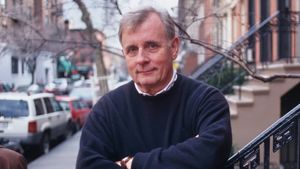





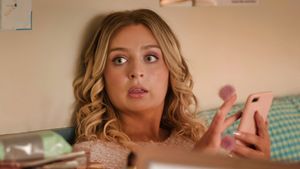




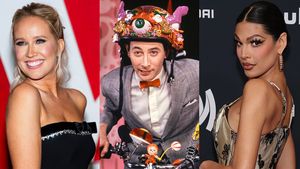












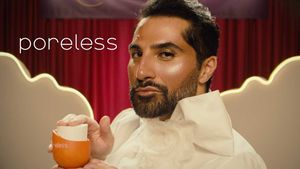



 Bisexual author and editor Rachel Kramer Bussel agrees: "I feel strongly that nobody owes anyone else their own self-identity. That would be a dangerous precedent to set, and if we're going to say Lindsay Lohan owes us to come out as bi, we might as well say Cynthia Nixon or anyone who's dated or slept with men and women owes us that. I don't think that furthers anyone's cause and find it a bit condescending. From the statement she gave ... Piers Morgan, I don't think she's denouncing anything about her former life."
Bisexual author and editor Rachel Kramer Bussel agrees: "I feel strongly that nobody owes anyone else their own self-identity. That would be a dangerous precedent to set, and if we're going to say Lindsay Lohan owes us to come out as bi, we might as well say Cynthia Nixon or anyone who's dated or slept with men and women owes us that. I don't think that furthers anyone's cause and find it a bit condescending. From the statement she gave ... Piers Morgan, I don't think she's denouncing anything about her former life."




